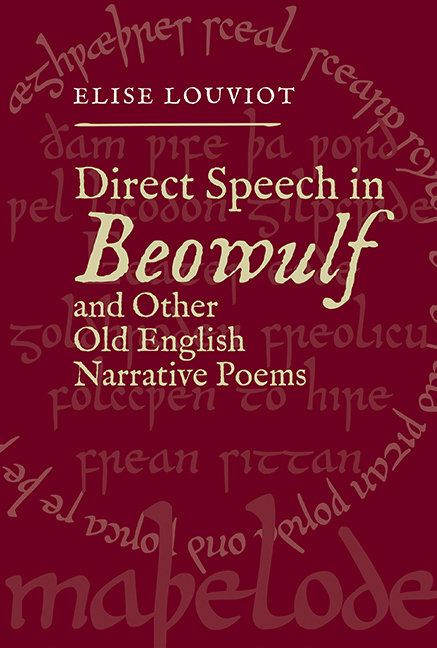Book contents
- Frontmatter
- Contents
- List of Figures
- Acknowledgements
- Introduction
- 1 The Form of Direct Speech
- 2 The Content and Context of Direct Speech
- 3 A Lack of Subjectivity?
- 4 Archetypal Subjectivity
- 5 A Problem with Voices
- 6 A Problem with Point of View
- 7 Impossible Irony
- Conclusion
- Bibliography
- Index
- Anglo-Saxon Studies
- Frontmatter
- Contents
- List of Figures
- Acknowledgements
- Introduction
- 1 The Form of Direct Speech
- 2 The Content and Context of Direct Speech
- 3 A Lack of Subjectivity?
- 4 Archetypal Subjectivity
- 5 A Problem with Voices
- 6 A Problem with Point of View
- 7 Impossible Irony
- Conclusion
- Bibliography
- Index
- Anglo-Saxon Studies
Summary
In texts produced by a very different culture to one's own, some elements are always particularly difficult to interpret correctly. Notoriously, humour does not translate very well from one culture to another, while implicit suggestions are by nature more elusive than explicit statements. Understandably, then, irony, which is a form of humour relying on implicitness, is very tricky to interpret correctly in a text from a different culture.
In spite of this inherent difficulty, the concept of irony has proved very popular in Old English studies. Of all the books and articles on Old English poetry consulted for this work, at least one in ten uses the concept, which is a considerable proportion. However, it seems that many of them use the term rather loosely. Certainly, very few provide a precise definition for it. As a consequence, it is difficult to determine whether its application to a particular example is appropriate or not. This chapter will examine the notion and its theoretical implications in detail before reviewing the main passages of Old English poetry that have been interpreted as ironic by scholars.
The Concept of Irony
Like many other rhetorical concepts, the word ‘irony’ has its origins in ancient Greek. The word eirôneia (ε?ρωνε?α) is derived from eirôn (ε?ρων), which designates someone cunning, a liar and a deceiver. Since Plato's Republic, the concept has become closely associated in classical philosophy with the way that Socrates uses feigned ignorance and naivety to question his addressees and lead them towards a better understanding. Classical rhetoric usually retains that reference to Socrates, but it also develops a concept of irony as a mere antiphrastic trope, that is, as the use of a phrase to mean the contrary of its literal signification.
The definition of irony as an antiphrastic trope is very problematic and almost universally rejected today. One aspect of the rejection has to do with the interpretation of tropes more generally. Classical rhetoric tends to analyse tropes as devices where the literal meaning of a lexical item has to be mechanically replaced by another, related meaning.
- Type
- Chapter
- Information
- Direct Speech in Beowulf and Other Old English Narrative Poems , pp. 223 - 250Publisher: Boydell & BrewerPrint publication year: 2016



